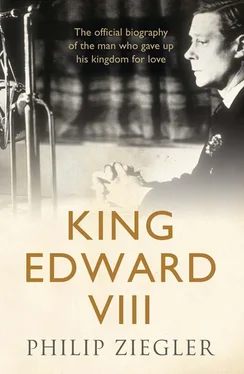When the King visited France, the Prince of Wales was in attendance. He would have preferred to be with his battalion, but it was a welcome break from GHQ. George V was delighted with his son’s performance. ‘I am glad to say he is very popular with everyone and is tremendously keen to do anything he can,’ he told the Queen. 85The Prince had told his father that one of the worst features of life in France was the ignorance of and hostility to the Navy shown by most senior officers. He was often asked whether the Navy was doing anything at all. ‘Although I am now serving in the army, I never forget that I was brought up in the Navy … So it grieves … me much to hear these things said of my beloved service.’ 86Every time he saw the King he pleaded that he should be allowed to visit the fleet at Scapa Flow. The King, for some reason that neither Stamfordham nor the Queen could understand, at first took strong exception to the idea. Queen Mary was stirred to unwonted activity on the subject: ‘There can be no possible objection to your going now … You may certainly count on my support.’ 87They won the day. In August 1915 the visit took place. Godfrey Thomas accompanied the Prince and recorded his delight and child-like enthusiasm for all he saw.
On the return journey they were cajoled into breaking their journey at Dunrobin, home of the Duke of Sutherland. They had insisted the visit should be informal, but when the train arrived, wrote Thomas, there were ‘rows and rows of people in kilts. I don’t wonder the Prince was rather annoyed. He couldn’t find his cap or his cigarettes or anything and eventually rushed down the corridor to the carriage door using such fearful language that I’m almost certain the Duke and Duchess … must have had the benefit of the end of it.’ The drive to the castle was lined with troops; the Prince travelled with the Duke ‘looking perfectly furious and hardly uttering’. This visit over, the Prince and Thomas spent a few days stalking at Abergeldie where Princes Harry and George were also staying. On the last day they all packed into a car to go to the railway station. ‘I can’t say we behaved very well en route, as any female passing us was waved and yelled at, and they sang loudly most of the way … By the time we reached Ballater, one of the strings of HRH’s deerstalker had broken, and the flap was hanging down in a drunken way. We were all dirty, sweaty and dishevelled, and must have looked like a lot of tramps.’ 88It had been a marvellous break from France, but it left the Prince dejected: ‘How I long to be back at sea again and infinitely prefer being a sailor to a soldier!!’ 89
George V used his son as a source of information on the senior generals. ‘I want to know privately if the C in C has had a row with Genl Smith-Dorrien,’ he asked in March 1915. ‘You might find out and let me know.’ 90The Prince had little useful information on this point but he did not spare Sir John French in his correspondence and his testimony must have contributed to the strong support George V gave Kitchener against the Commander-in-Chief. When Monro was succeeded by Sir Hubert Gough, the Prince was cautiously enthusiastic. At first he was dismayed by the new Corps Commander’s reluctance to let him visit the front line, then he became more approving as the rules were relaxed. ‘There is no doubt he is an able tactician and a good “pushing” general,’ he wrote in July. ‘He talks too much; that is his gt fault to my mind.’ 91
His views on most matters were orthodox and strident. He was strongly in favour of conscription, feeling that the whole nation must be mobilized if the war was ever to be won. 92He welcomed as irresistible the call to arms which his father delivered in October 1915. Who would have the heart to ignore such an appeal? ‘But no doubt there are thousands of these foul unpatriotic brutes about!! One almost begins not to think so highly of one’s country as one did!!’ 93Conscientious objectors were ‘loathsome’; he had twelve hundred of them working in the Duchy, ‘Disgusting looking men with long hair and they never wear hats; they loaf about the place and look at one with a very contemptible air!!’ 94Miners who struck for higher pay were still more loathsome, they should be put ‘straight into the trenches and send the whole crowd out patrolling, the first night they go in!!’ 95As for Roger Casement, the Irishman who sought to lead a German-inspired rising, he deserved least sympathy of all: ‘He should be publicly hung in Hyde Park or some open space where there is room for a large crowd.’ 96
His father and brothers would have echoed these views, as indeed would 90 per cent of the officers of the British Army. On most issues, though his parents might from time to time irritate him, he differed from his family very little. Increasingly it seemed to him that he had most in common with Prince Albert. The two had grown particularly close; ‘more so perhaps than most brothers, as our interests are the same,’ wrote the Prince of Wales early in 1915. ‘I am sure he will always do very well in the future; in fact I often feel that if I do as well as he does I shall be all right!!’ 97Prince Albert’s naval career was suffering from his ill health and he had been forced to work in the Admiralty, a dreary job which he performed uncomplainingly. ‘I must say I admire him tremendously for this and don’t hesitate to tell you he’s one of the best,’ the Prince wrote to Godfrey Thomas, knowing well that uncomplaining acceptance of ill fortune was not his own forte. 98Prince Albert, however, was not so uncomplaining when it came to the conduct of his parents. The two Princes united in a chorus of criticism. Prince Albert wailed about the ‘awful prison’ of Buckingham Palace: ‘The parents have got funny ideas about us, thinking we are still boys at school or something of that sort, instead of what we are.’ 99The Prince of Wales was no more enthusiastic about life in the Palace, especially after the King imposed a teetotal regime for the duration of the war: ‘Awful balls the whole thing. I don’t think it will have much effect on the drinking community. Lloyd George forced it on Papa.’ 100
As he grew older he became more adept at avoiding the sombre dignity of the family circle. By 1917 he was able to come and go more or less at pleasure. He was summoned for two weeks to Sandringham. ‘This little boy somehow says NO,’ he told Lady Coke. ‘He might possibly spend two or three days there, but not more, not for nobody, and he knows a bit too much for that!!!!’ 101– a point so close to his heart as to demand even more than his usual allotment of two exclamation marks. In London he still stayed always at Buckingham Palace, but tried to time his periods of leave so that he had at least a few days there without his parents. This did not always work out. ‘I am sorry your style was rather cramped during your leave in London,’ Lord Burghersh wrote sympathetically. ‘It’s exactly the same with me. Family so inquisitive.’ 102But it would be wrong to attach too much significance to such flights from the family nest. The Prince was far from rejecting his parents or demanding total independence. On his twenty-first birthday his father wrote to tell him: ‘You will have about £246,000 which … is a splendid sum of money which will go on increasing until you marry and set up house. Until then, I hope you will consider my home as your home.’ The Queen echoed her husband’s words: ‘I hope that for some years to come you, my darling Son, will continue to live under our roof, where you are and ever will be “le bienvenu ”.’ 103The Prince in his reply told his mother how pleased he would be to remain with his parents ‘until the fateful day arrives when I shall have to think about finding me a wife, and I trust that day is as yet afar off!!’ 104Privately he had probably made up his mind that he must set up on his own once the war was over, but he had no wish to confront his parents on such an issue while the war was still raging and long-term plans seemed impossible to make.
Читать дальше












